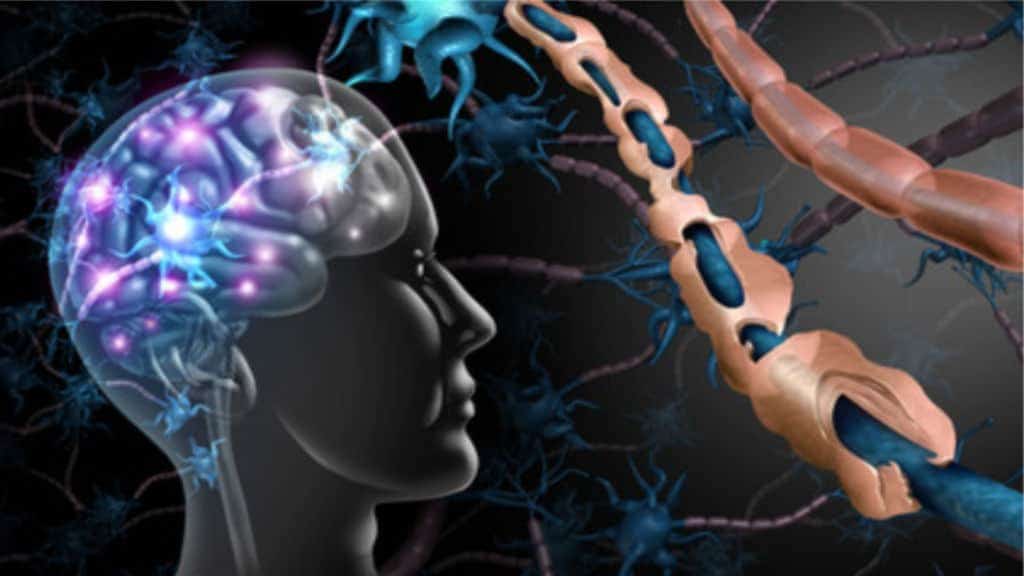Multiple sclerosis is a chronic inflammatory disease impacting the central nervous system. It affects millions of Americans each year.
The disease blocks the relay of messages between the brain and the immune system, which protects your body and its many vital functions. Thus, the immune system begins to mistakenly attack itself. Therefore, some medical professionals classify it as an autoimmune syndrome.
The lack of agreement on whether this condition is an inflammatory or autoimmune condition underscores a lack of clarity. While researchers know much about MS, they still cannot pinpoint the precise cause.
Here is what we do know. The ailment compromises your nervous system, your organs, and your health. This particular disorder targets the protective covering of nerve cells in the spinal cord and the brain, diminishing their function, and eventually rendering them useless.
Symptoms of multiple sclerosis can vary in the way they progress and how severe they get; while some only experience fatigue and numbness in the extremities, others experience loss of vision, problems with coordination, and paralysis.
How does MS develop?
While a definite cause has not yet been identified, it is thought that multiple sclerosis is triggered by certain viruses, environmental factors, stress, or a combination of all three as it causes the immune system to turn inward on itself, attacking delicate nerve cells of the brain and spinal cord. While there is no cure for MS as of yet, learning to live with the disease includes a plan that incorporates diet, movement, and management of nerve deterioration to provide a better quality of life.
18 Early Warning Signs of Multiple Sclerosis: Don’t ignore the symptoms!
It is critical to develop an awareness of signs and symptoms of MS and to identify them for proactive treatment that can reduce its severity and slow its progression. Many women, in particular, miss the early onset of symptoms because they are raising families, juggling responsibilities between work and home, and failing to provide themselves the type of self-care needed to identify and manage the disease. Look for these 18 early warning signs of multiple sclerosis that may help you on your pathway to better health:

1. Vision changes or vision loss
Problems with vision are one of the earliest symptoms that indicate possible MS. Inflammation in the brain affects the optic nerve that runs along the back of each eye; vision is compromised when this nerve does not properly function. You may experience blurry, double, or tunnel vision, as well as experience pain when moving your eyes. While vision loss can be a gradual progression, it is never something that should be taken lightly.
2. Numbness and tingling
The body’s message center is the brain and spinal cord; MS attacks these two nerve centers, making communication between the brain and extremities extremely difficult. When no signals are reaching parts of the body, this can result in numbness and tingling. You may experience intermittent tingling and loss of feeling in the face, feet, hands, toes, and fingers, with a gradual progression toward arms, legs, and other larger parts of the body.
3. Pain and spasms
Involuntary muscle spasms and pain are an indicator of possible MS; most people suffering from multiple sclerosis report that they have daily pain in one or more areas of the body. Stiff joints, muscles, and involuntary spasms become a part of daily life as the disease progresses.
4. Fatigue and weakness
Over 80 percent of people note that MS begins as chronic lethargy. This symptom occurs because nerves along the spinal column deteriorate, causing weakness in bone and muscle.
5. Dizziness and balance problems
Issues with coordination and balance can make mobility a problem for those with undiagnosed multiple sclerosis. People may often feel lightheaded, dizzy, and experience periods of vertigo, where they feel as if their surroundings are swirling around them. Occurring most often when someone stands up, this symptom comes and goes at first, then becomes a part of daily experience.
6. Dysfunction of the bladder and bowels
Almost 80 percent of patients with MS report some bladder and bowel dysfunction. Problems can include frequent urination, strong urges to urinate, or even inability to hold urine. Less frequently, people may experience issues with bowel control, including constipation, diarrhea, and loss of control.
7. Sexual complications
Stimulation in the nervous system influences sexual response in both men and women. As multiple sclerosis develops, the loss of nerve sensitivity and function becomes evident as sex drive decreases, sexual responses lose their luster, and complications occur. In men, this lack of sexual response can be particularly stressful, as it causes erectile dysfunction.
8. Cognitive issues
Unfortunately, the brain is very affected by the onset of MS and its symptoms. Signs that cognitive decline is taking place include:
- Memory loss
- Shorter attention span
- Problems with language and understanding
- Difficulty staying organized
Because of this cognitive degeneration, MS can also take a toll on emotional health.
9. Emotional volatility
Developing depression becomes common for those suffering from MS. Stress of the condition can also cause irritability, anger, mood swings, anxiety, and sadness. In some people, this emotional instability manifests itself as a condition called the pseudobulbar effect—bouts of alternating crying and laughing that the patient cannot predict or control.
10. Hearing loss
For some people, damage to the neural pathways in the brain responsible for aural stimuli can cause tinnitus and, eventually, hearing loss. Some other patients experience a very sudden and dramatic hearing loss that takes place almost instantly; in either case, the loss of one of our most precious senses is traumatic.
11. Seizures
Seizures may be one of the first noticeable signs of MS before a doctor makes a diagnosis. Even if epilepsy is not a known condition, close to 5 percent of people with MS experience some sort of seizure activity as the brain begins to break connections with neural pathways that affect other areas of the body.
12. Tremors
Tremors are involuntary muscular twitches that result in a rhythmic, back-and-forth motion of a body part. Hands and feet can most often be affected, but tremors will likely spread to include the legs, head, vocal cords, and trunk. They could be mild in nature or worsen over time.
13. Breathing difficulties
The autonomic nervous system controls breathing; most of us do not have to think about regulating our breath while we go about our daily activities. As the progression of multiple sclerosis takes hold, it compromises the ability of the autonomic nervous system to carry out its automatic functions. As a result, a person can begin to develop breathing difficulties that make it difficult to carry out daily activities.

14. Slurred speech
As the brain and nerve communication breaks down, messages that are intended to be translated into speech become mixed up, making it difficult for someone to communicate clearly. Loss of muscle control in the cheeks, mouth, and tongue may make the formation of both vowels and consonants more difficult over time, and even the most articulate may find it increasingly more frustrating to try and express themselves through speech.
15. Trouble swallowing
Lesions may develop throughout the body in someone with multiple sclerosis, and it can be difficult to swallow past these open sores, making it almost impossible to eat and drink. This loss of muscle control around the mouth and in the esophagus increases the risk of choking when a person is attempting to eat and drink; extreme care must be used when eating to ensure that you can safely ingest liquids and solid foods.
16. Increased menstrual problems
Many women report an upswing in symptoms of multiple sclerosis when they have their period–medical professionals attribute these symptoms to a drop in estrogen levels that exacerbates symptoms. Exaggerated symptoms include dizziness, fatigue, compromised balance, and muscle weakness.
17. Pregnancy complications
While pregnancy and fertility are not affected by symptoms of MS, symptoms tend to return post-partum. Some common complaints of pregnant women may be passed off as common issues, like pain, fatigue, and mood swings. They could also be signs that a diagnosis of multiple sclerosis is afoot; looking at the symptoms and noting their frequency, duration, and severity will help you navigate a course of treatment if MS is discovered.
18. Worsening menopause symptoms
For some women, symptoms of multiple sclerosis become much worse at the onset of menopause. This may be due, in part, to a drop in estrogen levels that the body is no longer producing. Hormone replacement therapy might ease menopausal symptoms. However, you may be putting a band-aid on other things that may be occurring. Hormone replacement therapy has had links to heart disease, breast cancer, and stroke, so it may not be a good choice for taking care of seemingly minor aches and pains that could quickly evolve into large health issues.
 Final Thoughts on Receiving a Diagnosis of Multiple Sclerosis
Final Thoughts on Receiving a Diagnosis of Multiple Sclerosis
Multiple sclerosis is a challenging and potentially life-altering disorder. However, you can take measures to avoid the fast progression of symptoms. Your best defense against MS is to see your doctor immediately if you begin experiencing any of the above signs and symptoms that could point to its existence. Don’t hesitate; proper diagnosis and prompt treatment will make all the difference in how you’ll be able to safeguard your health and wellness.














 Community
Community

